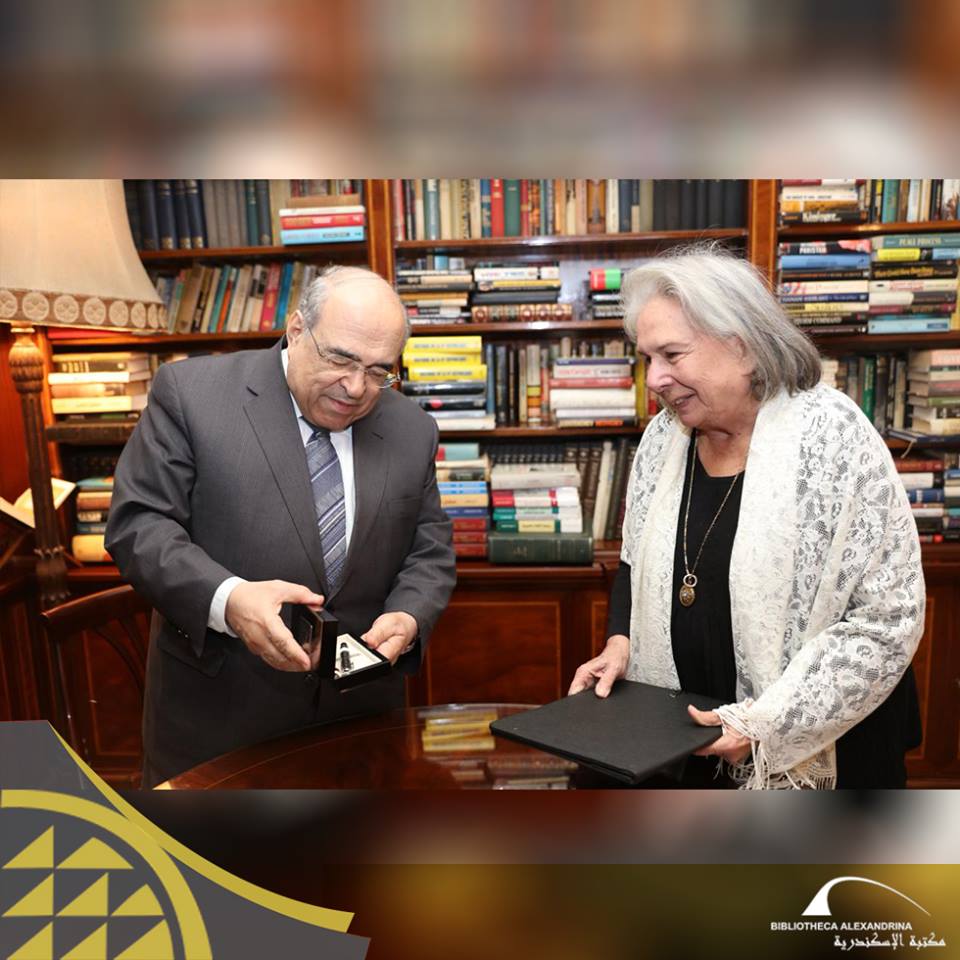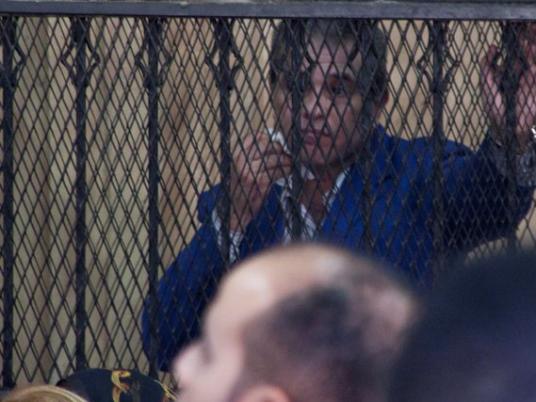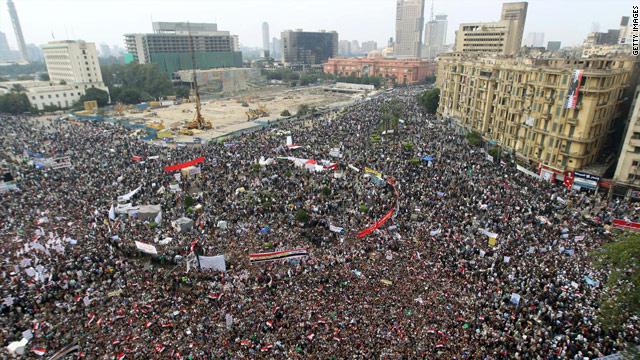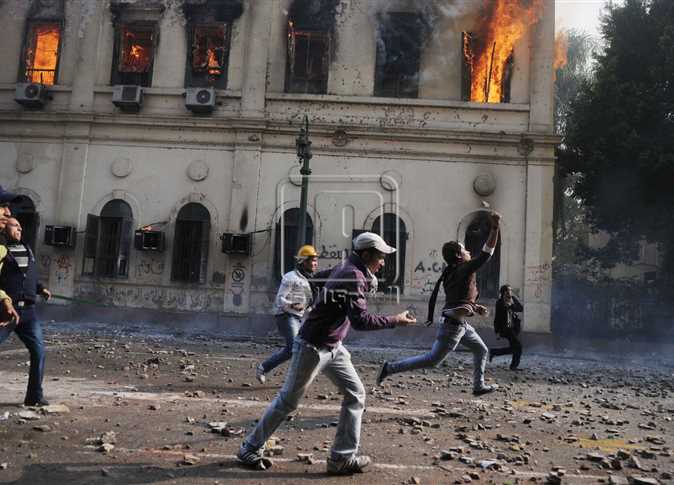Thursday’s state-run Al-Ahram arrives with a clear message from the Supreme Council of the Armed Forces in its leading headline, which proclaims that, despite recent rumors, there is “no intention of pardoning [former President Hosni] Mubarak.” Furthermore, SCAF officials reiterated their vow to remain uninvolved in ongoing investigations into members of Mubarak’s regime and stated that such responsibility belongs solely to the “great Egyptian judiciary.”
Officials from the Supreme Council of the Armed Forces also took the opportunity to emphasize a previously stated warning against any individual or organization spreading rumors with the intent of causing a rift between the people and “their arm which cannot be amputated,” by which was meant the armed forces.
The state-owned paper’s lead report also mentions another dispelled rumor, this time by Mubarak family attorney Farid al-Deeb, who announced on Thursday that claims the former president had recorded an audio speech, in which he asked for forgiveness and to be pardoned, were also false. In his announcement to the media, al-Deeb also said that media estimates of the Mubarak family fortune were grossly exaggerated. However, the lawyer did admit that Gamal Mubarak’s fortune “far exceeded” that of his brother Alaa.
Al-Ahram also reports on Mohamed Hassanein Heikal, who has been summoned by the judiciary for questioning, following his televised statement in which he claimed that the Mubarak family fortune amounted to “nearly US$11 billion,” according to a report available at the World Bank. Heikal is expected to be questioned with “a few days’ time.”
Thursday’s newspapers are not without comic relief. A headline in Al-Akhbar, “fistfight in the Kuwaiti parliament,” supported by an image of several men in white galabiyas bending another man over a table and slapping him, is a reassuring reminder that the situation in Egypt is not entirely as bad as it could be.
Independent Al-Dostour leads with the diesel fuel crisis, which it claims has expanded into a “jerrycan revolution” in several governorates, complete with “gun battles and knife fights, forcing station owners to disperse customers by force.” With 15 individuals injured so far, the paper reports that the worst of the violence occurred in the villages of al-Bakliya, Bulqas, Dakrans, and al-Simbelawein.
Meanwhile, a former convict in Beni Suef stabbed and killed his wife after she was unable to cook his dinner due to the shortage of butane gas cylinders.
Al-Dostour also reports on the members of the Doctors Syndicate, who have announced their decision to put their strike on hold until their meeting with Prime Minister Essam Sharaf, scheduled to take place next Sunday. On 10 May, an estimated 230,000 doctors, approximately 80 percent of the syndicate’s members, went on strike, demanding an increase in the health care funds from 3.5 percent to 15 percent of the national budget, the improvement of working conditions and hospital services, the impeachment of Doctors Syndicate President Hamdy al-Sayyed, and the replacement of the interim Health Minister Ashraf Hatem, as well as a salary increase for doctors and the complete overhaul of the medical system, which they claim to be corrupt and inefficient. The strike has been put on hold so that the doctors can have the opportunity to communicate and plan their next course of action with syndicate members in other governorates across the country.
For its lead story, Al-Shorouk clarifies the “gift loophole,” which it claims has been the reason officials from the past regime such as Zakariya Azmy, Fathi Sorour, and even former first lady Suzanne Mubarak, have been able to secure their release, however temporary it may be. The independent daily explains that officials can justify the exponential and disproportionate growth of their financial fortunes as being caused by “personal gifts and contributions” given to them over the years, as there exists no law or article in the constitution detailing the proper procedure to investigate such claims. Furthermore, individuals under investigation do not have to actually present any evidence to prove their innocence, since Egyptian law is based on the assumption that “all defendants are innocent until proven guilty,” and only the presence of incriminating evidence can confirm an individual’s guilty status.
Speaking to Al-Shorouk, an anonymous official of the judiciary lamented the fact that members of the former “ferociously corrupt” regime had used their years in office to “cement” any loopholes in the law that might be detrimental to them should they ever be under investigation, while creating all sorts of new ones in their favor. The anonymous official stated that, as such, “it is exceedingly difficult to convict them, or pinpoint the size, and location, of their assets.”
Despite its lineup of particularly sensationalist headlines – which include, but are not limited to, Mubarak’s “documented” involvement in Sadat’s assassination, Zakariya Azmy’s clandestine artifact-smuggling ring, and Mohamed Hassanein Heikal’s role as the “architect of destruction in Egypt,” – Al-Wafd’s actual front page content is limited to an editorial, and a report on businessman Magdi Rasekh (father-in-law of Alaa Mubarak) and former Minister of Housing Ibrahim Suleiman, both of whom have been referred to criminal court on charges of embezzling public funds. The independent daily reports that the illegal behavior allowed the two to turn a profit of approximately LE900million. Al-Wafd confirms that four of Suleiman’s assistants have also been referred. Meanwhile, a warrant has been issued for Rasekh’s arrest because the latter fled the country.
Egypt's papers:
Al-Ahram: Daily, state-run, largest distribution in Egypt
Al-Akhbar: Daily, state-run, second to Al-Ahram in institutional size
Al-Gomhurriya: Daily, state-run
Rose al-Youssef: Daily, state-run
Al-Dostour: Daily, privately owned
Al-Shorouk: Daily, privately owned
Al-Wafd: Daily, published by the liberal Wafd Party
Al-Arabi: Weekly, published by the Arab Nasserist Party
Youm7: Weekly, privately owned
Sawt al-Umma: Weekly, privately owned




